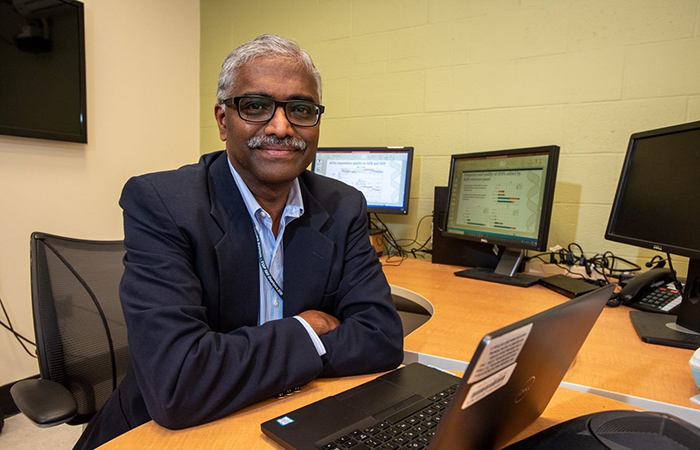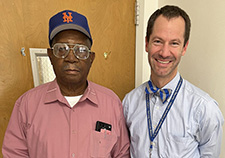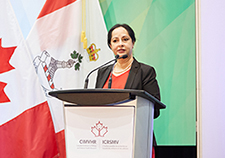Office of Research & Development |
 |


Dr. Saiju Pyarajan of the VA Boston Healthcare System led the design of the DNA chip, in consultation with researchers from VA’s Million Veteran Program. (Photo by Frank Curran)
April 26, 2021
By Mike Richman
VA Research Communications
"Everything about a person determines his or her ultimate health. That’s where we’re headed with the new chip."
It’s become a clear objective of VA’s Million Veteran Program, one of the world’s largest databases of health and genetic information: encouraging more racial and ethnic diversity in its enrollment, which is now at more than 830,000 in its climb toward 1 million and beyond. The greater the diversity, the program’s leaders believe, the more opportunities for genetic research into groups that have been traditionally underrepresented in the medical community.
The Million Veteran Program (MVP) is already one of the most genetically diverse health-related databases in enrollment, with African Americans at 20% and Hispanics at 8%. Native Americans and Asian Americans are both at 1% to 2%.

VA investigator brings diversity into autoimmune disease research

Veterans help find new cancer treatments

Million Veteran Program director speaks at international forum
To facilitate this genetic research, MVP recently launched a custom-designed tool that promises to speed breakthroughs to benefit Black and Hispanic Veterans and other racial and ethnic minorities. This “DNA chip” tests for more than 750,000 genetic variants, including over 300,000 that are more common in minority populations and are relevant to their health and well-being. The tool will help VA researchers learn more about conditions, such as cancer, diabetes, and heart disease in diverse groups, and to develop targeted treatments.
“This is what precision medicine is all about,” says Dr. Sumitra Muralidhar, director of MVP. “Looking at an individual person, his or her genetic profile, what they’ve been exposed to, what they eat, everything about a person. Everything about a person determines his or her ultimate health. That’s where we’re headed with the new chip.”
With genetic research, she says, MVP’s goal is to bridge gaps that exist in racial and ethnic populations and to make research relevant across the board.
“Many diseases disproportionately affect racial and ethnic minorities at a higher rate, such as prostate cancer, chronic kidney disease, heart disease, and diabetes in the Black community,” Muralidhar says. “In addition, there are racial and ethnic inequities in access to health care for socioeconomic and other reasons.
“It’s well established that participation of racial and ethnic minorities in research, in general, and in genetic research, in particular, is much lower than participation by Caucasians and people of European descent,” she adds. “Reasons that factor into this include a lack of opportunities and a lack of trust. Thus, research discoveries are sometimes not applicable across racial and ethnic populations, and minority populations are unable to benefit from research.”
The genotyping chip is a piece of silicon about the size of a postage stamp that contains hundreds of thousands of tiny bits of synthetic DNA that include a specific genetic variant, or chemical code. When DNA is extracted from a person via a blood sample, it’s added onto the chip in a test tube with special instruments. Only DNA that has a complementary chemical code will bind to the chip. The rest is washed away. The piece of DNA usually has a detectable marker attached like a fluorescent dye, for example, allowing researchers to identify those that bind and leading to the identification of genetic variants in DNA.
Researchers can then associate certain health traits—like increased risk for a disease or unfavorable reactions to a drug—with specific genetic patterns. This can lead to new therapies for patients with those gene profiles.
The MVP team, Muralidhar explains, has done a comprehensive literature review that enhanced the chip content to be able to detect more genetic variants in Blacks, Hispanics, and other minorities in future MVP studies. The researchers will be reanalyzing every sample from minority participants on the new ethnic-focused chip.
“The whole thing about understanding genetics and diversity is like a circular feedback loop,” Muralidhar says. “The more people you have represented from different racial and ethnic backgrounds, the more we’ll be able to discover genetic variants that contribute to their health. The more we discover, the more we can help that group. It’s a complete circular feedback loop.”
Dr. Saiju Pyarajan, director of the Center for Data and Computational Sciences at the VA Boston Healthcare System, led the design of the DNA chip, in consultation with MVP researchers. Dr. Rachel Ramoni, VA’s chief research and development officer, strongly supported the project and ensured funding for it.
Since being formed a decade ago, the Million Veteran Program has generated dozens of influential scientific publications. Currently, more than 30 studies based on MVP data are examining conditions including heart disease, diabetes, PTSD, schizophrenia, and suicide risk. In recent months, researchers have been using MVP data to study the impacts of COVID-19 on Veterans. The chip will allow MVP researchers to investigate if genetic changes are linked to COVID-19 complications in racial and ethnic minorities, Muralidhar notes.
To boost the involvement of Black, Hispanic, and other minority Veterans in the Million Veteran Program, MVP is collaborating with VA’s Center for Minority Veterans. MVP has been successful in engaging Veterans from minority communities partly because of the Center for Minority Veterans.
“Our goal is to be constant advocates for minority Veterans to the point of making sure they get current information about VA health care,” says Stephen Dillard, executive director of the Center for Minority Veterans. “So this is a good opportunity. We really appreciate the chance to partner with MVP in terms of making sure we reach our network to make sure they know about Veteran enrollment [in MVP] for the purpose of taking advantage of it.
“The psychology of VA is that everyone’s a whole Veteran, whole health,” he adds. “The first thing is to start with viable information. I think our role would be to partner with MVP in being the outreach arm to make sure we get the word out to our minority Veterans and their networks, partners, Veteran service organizations, Veterans in their communities, and faith-based organizations. That’s where the intersection is.”
MVP’s partnership with the Center for Minority Veterans may help push the VA program past the 1 million mark in enrollment, Muralidhar says. The new chip will increase what MVP researchers can learn based on blood samples and information from minority Veterans.
“Use of this chip will definitely help us better identify genetic variants associated with a particular disease phenotype in Black and Hispanic populations,” she says, “and therefore hopefully lead to better diagnostic markers and treatments for these minority populations.”
VA Research Currents archives || Sign up for VA Research updates